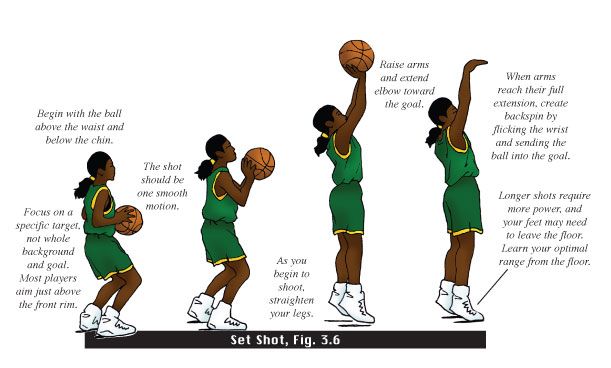Home »
Misc »
How to get a good jump shot in basketball
How to get a good jump shot in basketball
Basketball Tip: How to Master the Jump Shot
Basketball Tip
A great jump shot is one of the best things you can add to your game. The best part? You can practice this tip by yourself. Mastering this skill is all about technique, balance, and repetition but the most imperative part is your will to succeed. The greatest basketball players to ever play the game started just where you are now and worked hard to master this skill. Now it’s your turn. Here are a few jump shot tips, that are commonly taught at Nike Basketball Camps, to help take your game to the next level.
Before the shot
The first step in improving your jump shot technique is keeping your eyes on the rim throughout the whole shot. This will keep your form compact and will lead to a straighter shot. When you get ready to shoot, make sure your feet are shoulder width apart facing the basket and your knees are bent (much like a spring ready to release).![]() Next, you will move the ball into what is called the ‘shot pocket’. This means that you hold the ball just above your waist lined up to the basket. The final thing you do before you are ready to shoot is to find the right grip. In order to do this, you should place the ball’s air hole between your middle and index finger while spreading your fingers enough to feel like you can balance the ball. Let the ball sit on your shooting hand and get ready to begin your release.
Next, you will move the ball into what is called the ‘shot pocket’. This means that you hold the ball just above your waist lined up to the basket. The final thing you do before you are ready to shoot is to find the right grip. In order to do this, you should place the ball’s air hole between your middle and index finger while spreading your fingers enough to feel like you can balance the ball. Let the ball sit on your shooting hand and get ready to begin your release.
During the shot
After completing all of the pre-shot prep, you will be ready to move on to the next phase: during your shot. Make sure your other hand or “non-shooting hand” is on the side of the ball. This hand should not affect the ball’s spin and should not move upon release. Begin to bring the ball directly up from the balanced position you had it in keeping your shooting hand’s elbow underneath the ball. Keep the ball in front of you and all at once begin your jump, releasing all of your power loaded up in your bent knees and bent arms at once. Release the ball at the highest point your hands can go and keep your shooting hand pointing at the basket in a straight line. The ball should be in a backspin and you’re on your way to scoring a bucket.
Release the ball at the highest point your hands can go and keep your shooting hand pointing at the basket in a straight line. The ball should be in a backspin and you’re on your way to scoring a bucket.
After the shot
After the ball is released try and land in the same spot you jumped to make sure you are balanced. In your follow through your wrists should be relaxed on the way down and your fingers still pointing at where you wanted to shoot. Hold this position until the ball hits the basket.
If you can practice these steps consistently you will begin to see a major upgrade to your jump shot technique and results. Remember: practice makes perfect. Check out more basketball shooting tips and get better this summer at a Nike Basketball Camp near you.
Share This
See all the latests basketball tips
Six Tips To Improve Your Jump Shot
1. Always, Always Follow Through. As you may have heard this a hundred times before but it still remains true. A jump shot, after hours and hours of getting shots up, should become second nature. The muscle memory kicks in during games and you just rise up and shoot. By working on following through every time you shoot, your body will do it automatically in a game. A couple good tricks are for one to leave your wrist and hand after you follow through. Shoot the ball and just leave your fingers facing down and wrist bent for a couple seconds after a shot. Exaggerate it now to get the habit to stick. You also want it to be a soft follow through, not tense. Make sure that wrist is bouncy and loose. So after you hold that follow through, bounce your wrist up and down a couple times. Get it flexible and in the right motion.
A jump shot, after hours and hours of getting shots up, should become second nature. The muscle memory kicks in during games and you just rise up and shoot. By working on following through every time you shoot, your body will do it automatically in a game. A couple good tricks are for one to leave your wrist and hand after you follow through. Shoot the ball and just leave your fingers facing down and wrist bent for a couple seconds after a shot. Exaggerate it now to get the habit to stick. You also want it to be a soft follow through, not tense. Make sure that wrist is bouncy and loose. So after you hold that follow through, bounce your wrist up and down a couple times. Get it flexible and in the right motion.
If you keep having problems with your follow through, use mental notes to help you. Remember to “reach into the cookie jar” after you shoot or another note that will help you remember.
******* Register Now for a Winter Camp- Dec 26-28 and Jan 2-4 *******
2.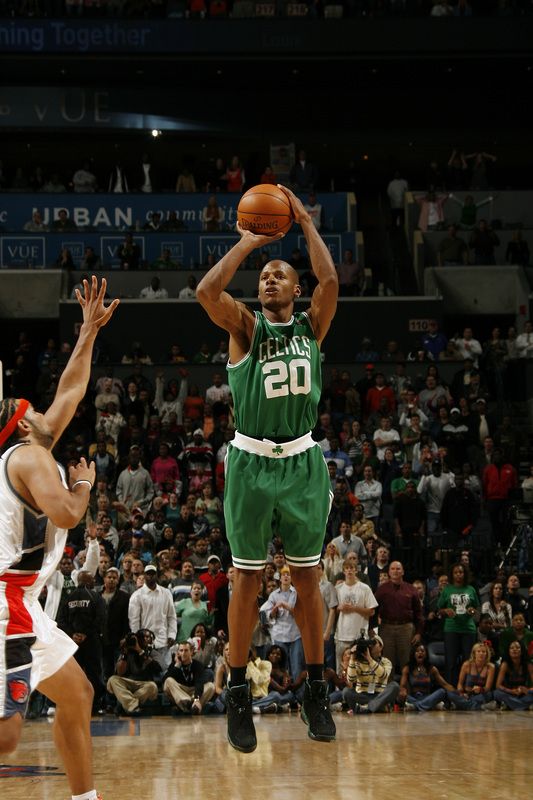 Keep Your Eyes Locked In. This is extremely important as even if your shot is perfect, if you put too much or little on the ball it’ll miss. Whether dribbling or waiting for a pass, keep an eye out for the rim. That extra second or so you have to eye up the shot will mean the world. Now when you get the ball or when you’re ready to pick up your dribble for a shot, your eyes and mind will already be ready to shoot. A good way to practice this when shooting free throws is to always keep an eye on the basket, not on the dribbling ball. Or when dribbling into a shot, have a count in your head. Count at least two seconds that you are starting at the rim before you shoot.
Keep Your Eyes Locked In. This is extremely important as even if your shot is perfect, if you put too much or little on the ball it’ll miss. Whether dribbling or waiting for a pass, keep an eye out for the rim. That extra second or so you have to eye up the shot will mean the world. Now when you get the ball or when you’re ready to pick up your dribble for a shot, your eyes and mind will already be ready to shoot. A good way to practice this when shooting free throws is to always keep an eye on the basket, not on the dribbling ball. Or when dribbling into a shot, have a count in your head. Count at least two seconds that you are starting at the rim before you shoot.
3. Maintain Your Balance. When shooting you should land in almost the exact same spot as where you jump from to start your shot. This will help you keep your balance and steady and the ball on a straight trajectory. For practice put a piece of tape down and jump from that when you shoot.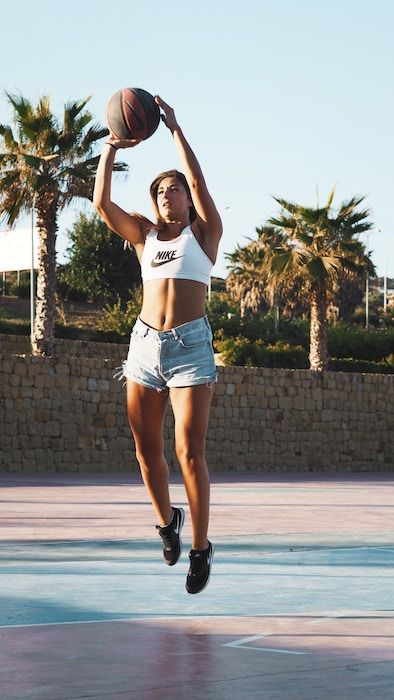 Look where you land. If you are not directly on the tape then try to jump more straight up and down.
Look where you land. If you are not directly on the tape then try to jump more straight up and down.
4. Keep Reminding Yourself. There is memory involved with all these steps. Notice if you didn’t look at the rim before you shot last time, didn’t follow through, or ended up in a different spot than where you started your shot. When practicing just think for a second if you did all the right steps and if not, focus on that one step you missed the next shot.
5. Shoot Game Shots In Practice. When shooting around often you shoot three pointers or couple dribble pull up shots. Shoot more like game situations. Run off a fake pick to get a shot, pull up for a bunch of foul line jumpers in a row, pop up from the block for a shot. Shoot the shots you seem to take during the game. Warning you may need a partner for some one the off-ball shots.
6. Be Fluid. Shooting is all about doing the same thing every time once you develop the right mechanics. Your shot usually missed because you did something differently than you normally do. Be relaxed but confident at the same time. And practice shooting as many times as you can so you get consistent shooting the same way. Even bad form can become a good shot if they practice it so the shot is perfectly the same every time. Soon enough you shouldn’t even think when you shoot, just react and shoot the way you’ve practiced.
Your shot usually missed because you did something differently than you normally do. Be relaxed but confident at the same time. And practice shooting as many times as you can so you get consistent shooting the same way. Even bad form can become a good shot if they practice it so the shot is perfectly the same every time. Soon enough you shouldn’t even think when you shoot, just react and shoot the way you’ve practiced.
If you like this post, here are some others you may enjoy (click title to read):
1. A Guide To Rebounding Part One: Proper Positioning
2. Warm-Up Week: Five Drills To Get You Game Ready
3. Five Tips To Get Open Off The Ball
4. A Guide To Rebounding Part Two: Boxing Out
Shooting exercises
replica swiss watches
Basketball is a great team game, the team consists of players whose skill is achieved with great effort. The only person who can understand that you are working hard is yourself. Remember, you only get out of the game what you put into it. Give yourself to her without a trace.
Remember, you only get out of the game what you put into it. Give yourself to her without a trace.
Jump shot
In basketball, an outstanding sniper is a piece item. If you want to be a great sniper, all you need to do is just want to be one.
First, you must improve your skills.
This includes having a good coach and years of training. Secondly, you must improve in game mode.
This means that you must perform throwing drills at the same intensity as in the game. It's far better to hit 100 shots in play than 500 sloppy shots that a good defender would never let you make in a game. Finally, you must understand that working on a roll is like investing in a bank. If you don't deposit anything into your account, you won't receive dividends when you need them.
The sniper must have "throw school". When throwing after a dribble, one of the main features is the last hit of the ball on the court, which must be fast and strong so that it bounces higher, right into your hands - this will help you not waste time handling the ball.
Individual Shooting Exercises
Exercise 1 Attention Concentration
- Start from a distance close to the ring.
- Throw with one hand. Follow correct technique.
- Make five from each position. Take a step back and repeat (Fig. 1).
Exercise 2 7 throwing positions and rebound (4 meters)
- Jump shot from position 1.
- Pick up the ball, dribble quickly to position 7, shoot.
- Pick-up, fast with guiding back to position 1.
- Make 10 rolls.
- Repeat the same steps using positions 6 and 2, 5 and 3, 4 (Fig. 2).
Exercise 3 7 shooting positions and a rebound (from behind the three-point line)
1. Repeat the same steps as in exercise 2 (fig. 3).
Exercise 4 Throw after stop
- Start from position 1, toss the ball to position
- Pick it up, while you have to run around the ball so that you are facing the ring.
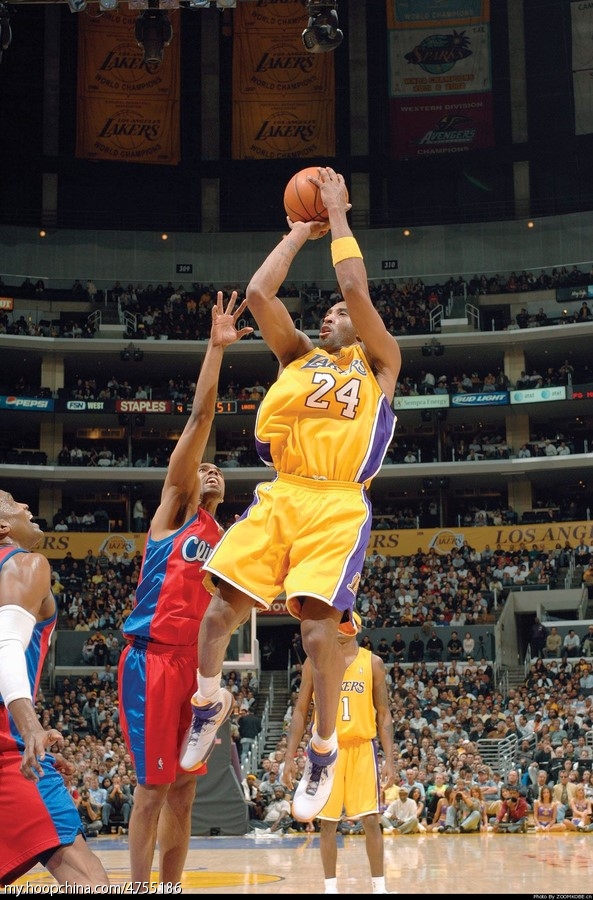
- Make 10 rolls, then advance to the next position.
Ex.5 Shooting from five positions after a fake move (from four meters or from behind the three-point line)
- Start from any position.
- On bent knees and with your head up, you do a throw feint, hit the ball one or two with your right hand, stop and jump.
- Return to position, throw feint, one or two hits with the ball with the left hand, stop, throw.
- At each position, 5 attempts (Fig. 5).
Exercise 6 Jump shots after dribbling
- Start the exercise from the center of the field, move towards the hoop with dribbling at game speed, after stopping quickly shoot.
- The shot must be taken from a middle distance or from behind a three-point arc. Perform the exercise, both on the right and on the left and in the middle of the site.
- Use different types of dribbles: fast dribbles, broken tempos, pivots, etc.
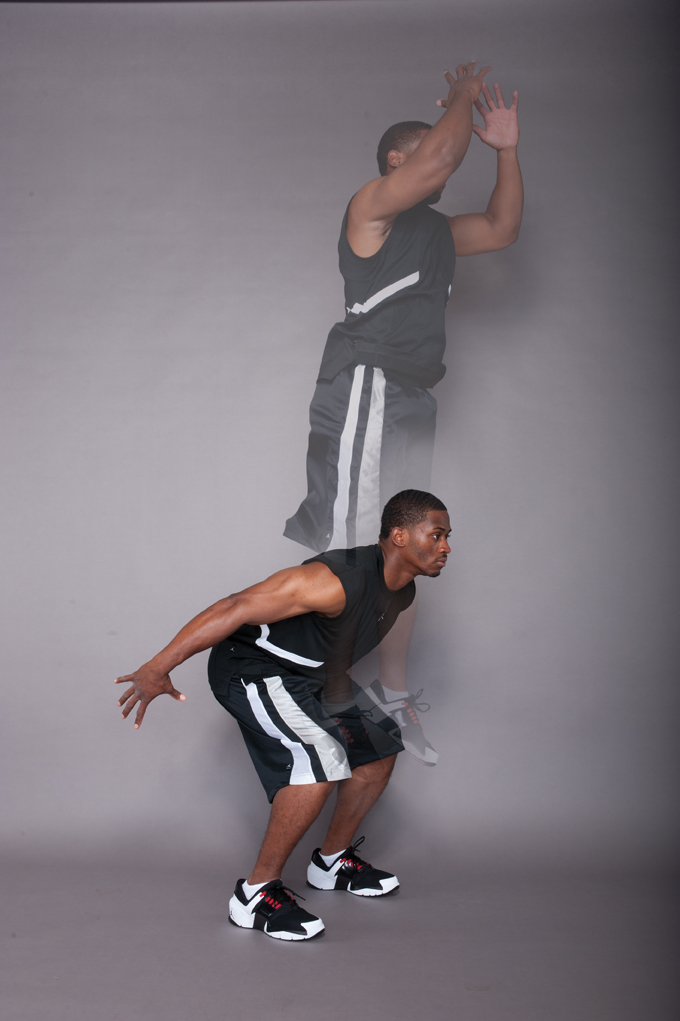
- Make 5 attempts in each direction (Fig. 6).
Exercise 7 Playing with a virtual opponent
- Perform a free throw. If you have implemented it, you get one point. If not, then your "opponent" is three.
- You make subsequent throws from any position except the three-second zone, imitating the rhythm of the game. Work on different moves and throws. Each of your successful attempts is estimated at the bottom of the point, unsuccessful at two for the "opponent". The game goes to 11 points.
- This is a very good exercise to consolidate what you have learned. Try! Improve! (Fig. 7).
Double shots
Dr. 8 2 players, shot and rebound (4 meters or from behind the three-point line)
- The drill starts with a good, clear pass. The player who made the pass from under the basket goes to the place of the thrower.
- The player in position 1 catches the ball and shoots.
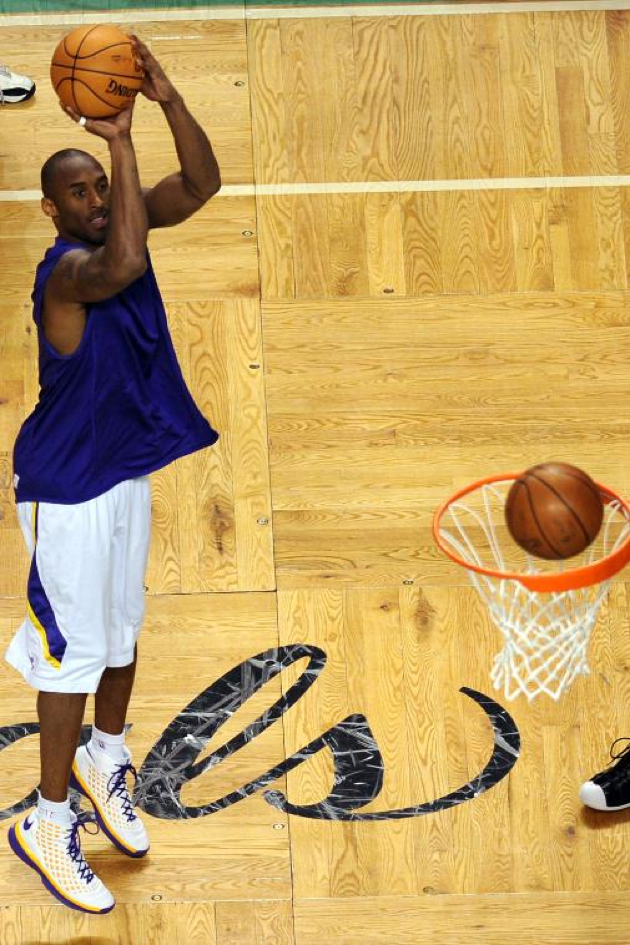
- After the shot, the player runs to the rebound and then passes the ball 1 position and so on.
- Each player must make five throws. The exercise is performed at a fast pace, but the throws should not be sloppy.
- Then move to another position and everything is the same (Fig. 8).
Exercise 9 Two players, throw and rebound (per result)
- The exercise is performed as described above.
- The player who made the pass tries to interfere with the shot, but does not block.
- Game up to 5 hits.
- Then we move to another position, and so on. (Fig. 9).
Exercise 10 Two players, throw and rebound, throw feint
- The exercise is performed in the same way as the previous one.
- The defender who made the pass tries to interfere with the player in position 1, but does not block the shot.
- The attacker makes a throw feint and beats the defender.
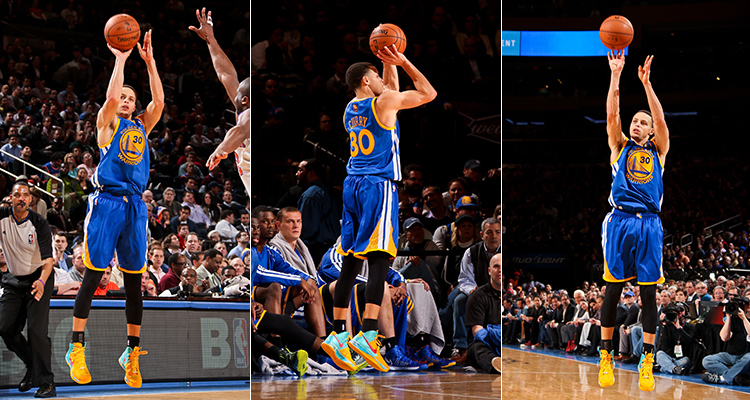
- Performs a short dribble, stops and throws.
- Do 5 times each and change position (Fig. 10).
Ex. 11 2 players, shot after a stoppage (from four meters or from behind the three-point line)
- The attacker is in position 1, ready to receive the pass.
- The player under the basket passes.
- After the throw, the attacker waits for the rebound to be made.
- The player receives a pass by making a stop, but already in position 2. Then back.
- Make 7 throws, two free throws and switch (fig. 11).
Ex. 12 Shooting with movement (from four meters or from behind a three-point arc)
- The attacker moves around the perimeter at game speed.
- A player passes to the hand farthest from the ring.
- The attacker must stop, catch the ball and throw.
- Make seven throws, two free throws and change (fig. 12).
Note: The previous exercise has three options.
A) Receive the ball and throw it.
B) After receiving, throwing feint, dribbling in the same direction, throwing.
B) Receives a pass, throw feint, dribbling to the ring in the other direction, stop, throw.
Ex.13 Various dribbling options and a jump shot
- The attacker starts from the center of the field and, dribbling at game speed, moves towards the ring, stops and takes a jump shot.
- The player under the basket picks up the ball, the attacker runs to the center of the field, and receives the ball on the opposite flank. Moves with dribbling to the ring, stop, jump shot.
- On the right side, dribble with the right hand, on the left - with the left (Fig. 13)
Note: Use speed dribbling, change of pace, transitions, pivots.
Three players, two balls
Exercise 14 Warm-up exercise
- One player throws, another passes, a third rebounds.
- Thrower becomes rebounder after seven tries.
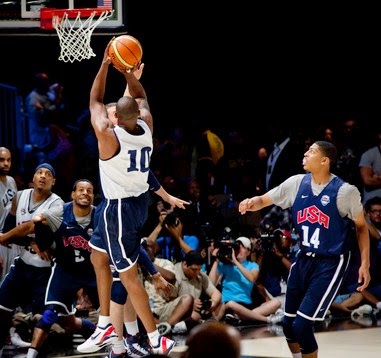
- Passer - thrower. Picking up - passing (Fig. 14).
Note: different options are possible
1) From seven positions (four meters)
2) From seven positions (from behind the three-point arc)
3) From five points with feints to shoot
4) Throw after stoppage
5) Throw and rebound (constant rotation around the circle)
Double throws: using screens
To use the screen effectively, you must read the defender correctly. You must always see the player with the ball and how the defender defends against you. A player who moves well off the ball and knows how to use screens correctly is very useful offensively. When you watch a match that has good players, notice how well they move off the ball. The hardest thing to defend against is a well-moving attacker.
Exercise 15 Back screen and snatch
- The player imitates opening and screening behind his back, makes a dash to the corner of the court.
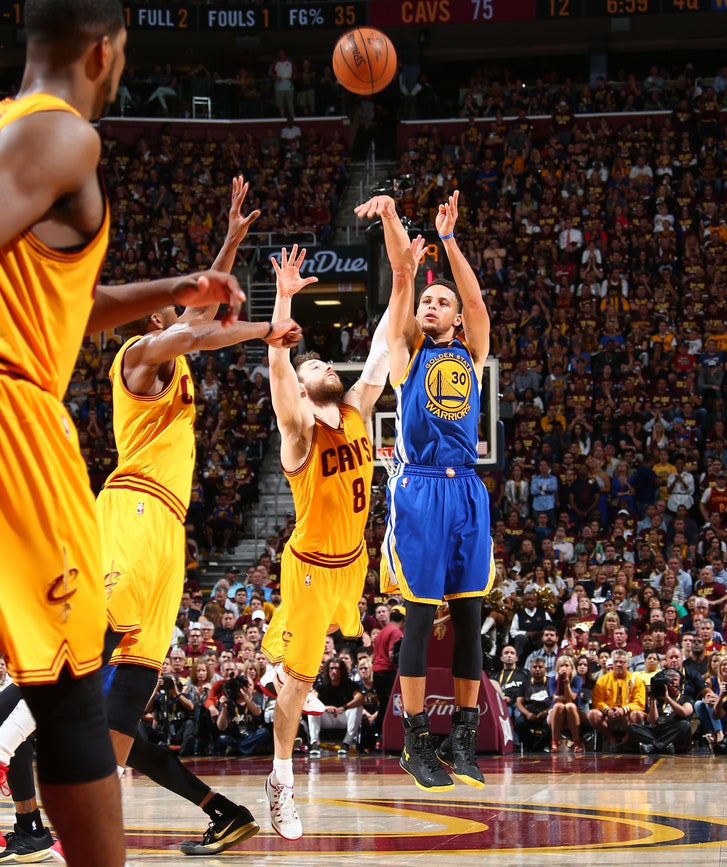
- Throw to the nearest hand.
- Attacker catches the ball and shoots.
- The attacker picks up his shot, passes to a partner and returns to his original position.
- Make seven attempts and change (Fig. 15)
Note: do not back away when dashing, turn around and run, but do not lose sight of the ball.
Exercise 16 Screening behind the back, "false" screening
- 1. Attacker starts on the base of the trapezoid and moves up to imitate the screening.
- 2. After the imaginary breakout runs, the screening attacker rises to the ball and prepares to receive the pass.
- 3. Having caught the pass, he immediately makes a throw.
- 4. Make seven attempts and change (Fig. 16).
0003
- An attacker imitates a defender aiming for a screen and rises sharply towards the ball.
- The player must be ready to receive the ball.
- The attacker catches the ball and makes a quick throw.
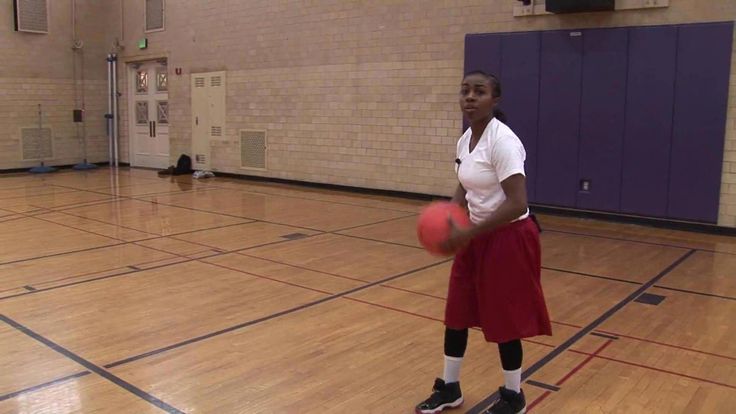
- Make seven attempts and change (Fig. 17)
Exercise 18 Screening the ball carrier, moving away from the ring
- The attacker screens the ball carrier.
- The ball carrier passes through the screen aggressively.
- Instead of pulling back to the basket (deuce), the screening attacker moves away from the basket and prepares to receive the pass.
- Having caught the ball, he immediately makes a throw.
- Make seven attempts, then change.
Exercise 19 Barrier at the base of the trapezoid - opening to the flank
- The attacker takes the player under the ring, breaks shoulder to shoulder through the barrier and makes a dash to the flank.
- When catching the ball, the player must turn to the ring.
- Use different throw options: just throw, and dribbling to the right or left after a throw feint. Change after five attempts (Fig. 19).
Exercise 20 Screening at the base of the trapezoid - opening into the corner of the court
- The attacker leads the player into the three-second zone, pretends that he will break through to the flank through the screen, the defender starts running around the screener through the three-second zone.
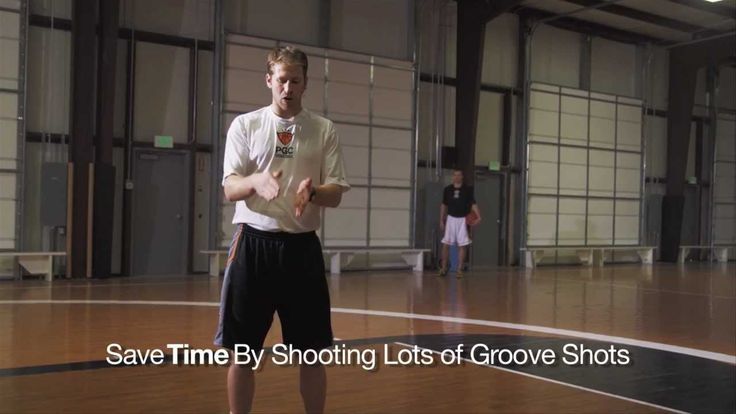
- The attacker makes a dash to the corner of the court, and the defender hits the screen.
- Further, the same as in the previous exercise (Fig. 20).
Ex. 21 Screen at the base of the trapezoid - dash inward
- The defender is chasing you, not falling behind until the very screen.
- Then you run through the screen as close to the screener as possible and break into the three-second zone or foul line area.
- Receive the ball by turning towards the hoop and throw it.
- Also work out various options for continuing after receiving the ball. After five attempts, change (Fig. 21).
Throws in pairs: pass and discount
Exercise 22 Pass and discount - starting from the center of the field flank.
The receiving player is opened for transmission. Player receives a pass and shoots. The player who made the pass picks up the ball and gives it to the thrower.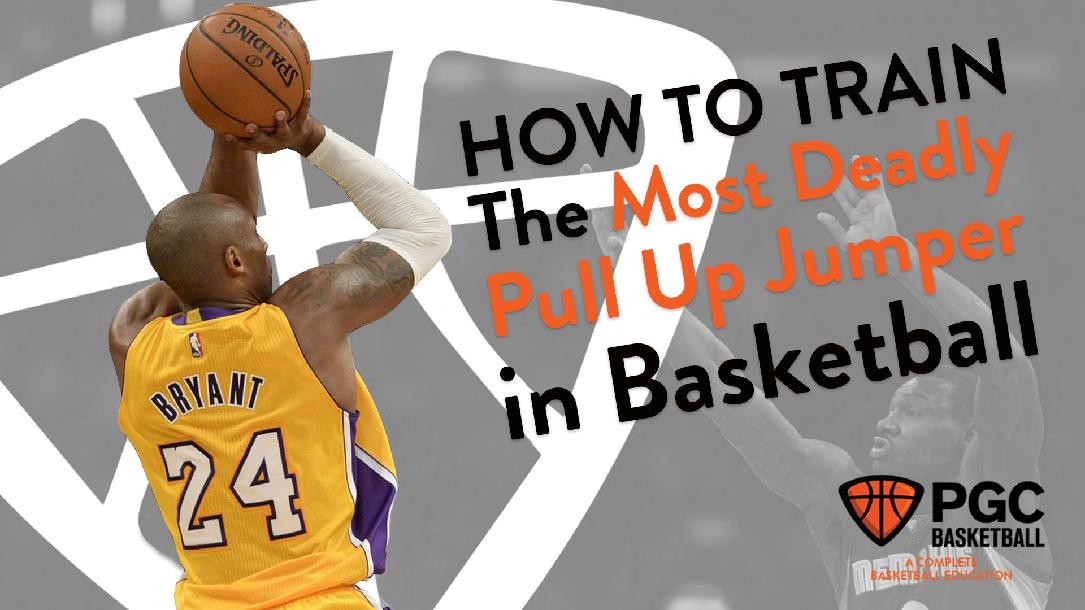 Players switch roles. Everyone makes ten throws (Fig. 22).
Players switch roles. Everyone makes ten throws (Fig. 22).
Exercise 23 Pass and discount - start from the flank
Variation of exercise 22 (Fig. 23)
Exercise 24 Pass and discount - start from the corner of the site one more
exercise 2
more variation 3 .24).
9 ways to improve shot performance without changing their structure — All about basketball
9 ways to improve shot performance without changing their structure.
Jay Wolf
(Basketball Shot Specialist)
To be honest, it's not a good idea to change the mechanics of shooting during the season, if only because it entails a decrease in performance. What can be done to prevent this from happening? Here are a few tried and tested recommendations.
Improving short distance and basket shots
1. Require all short distance shots to the right and left of the basket to have a bounce and point of aim.
This forces the striker into position to use the shield when throwing.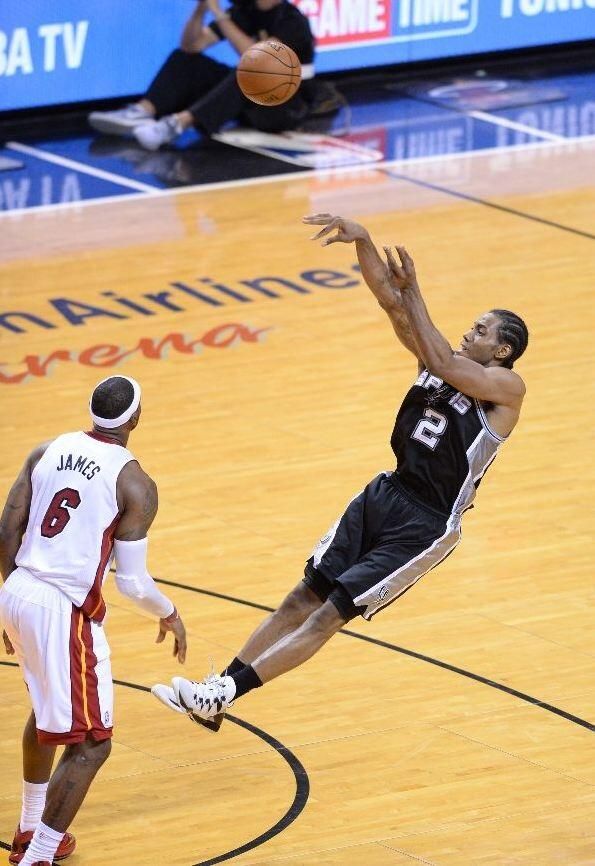 The upper half of the vertical line to the right and left of the basket is the aiming point for these types of shots. The ball should touch the line softly and bounce straight into the basket. Misses that occur when throwing from these positions are the result of insufficient concentration. To increase your attention to the aiming point during training, draw a dollar sign - $, or some other sign, on a piece of adhesive tape, and attach it to the line.
The upper half of the vertical line to the right and left of the basket is the aiming point for these types of shots. The ball should touch the line softly and bounce straight into the basket. Misses that occur when throwing from these positions are the result of insufficient concentration. To increase your attention to the aiming point during training, draw a dollar sign - $, or some other sign, on a piece of adhesive tape, and attach it to the line.
2. Practice CLEAN basket shots and CLEAN bounce shots from the second mustache.
CLEAR throws require the ball to drop into the basket without touching the metal hoop. To achieve this, the ball must touch the backboard very gently. This requires a much greater concentration of attention and calculation of the trajectory. To achieve consistency, make 5 throws from under the hoop (or rebound jump) in a row, 3 of which must be CLEAR. Make it harder if you feel the need to.
NOTE: It is important to match the mission to the abilities of each player.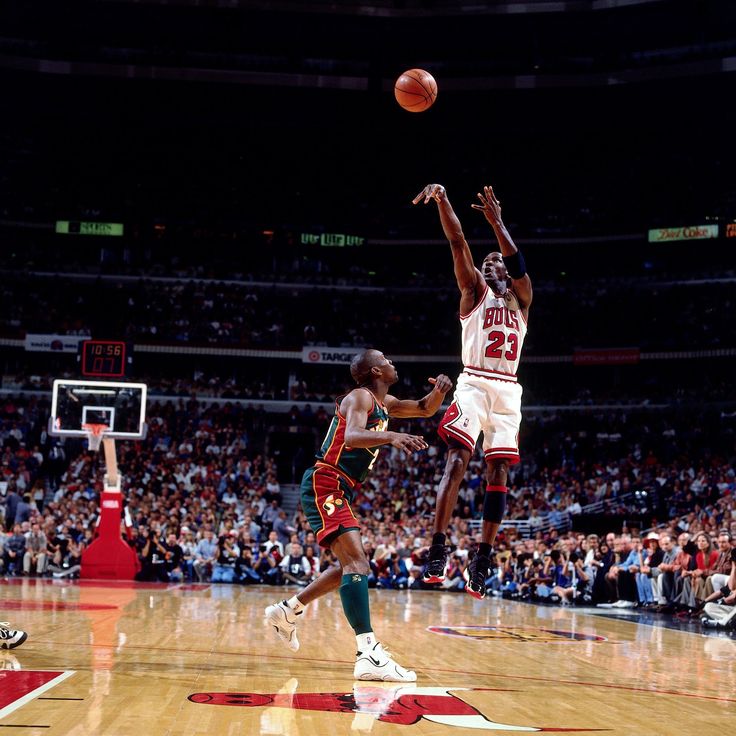 The mission should challenge the player's sense of pride, requiring greater focus, but should not be unattainable.
The mission should challenge the player's sense of pride, requiring greater focus, but should not be unattainable.
Perfecting Medium Range and 3-Point Shots
3. Practice CLEAN throws - make 5 shots in a row from the same spot.
This task develops stable accuracy as it requires great concentration and persistence. Five throws in a row from the same point improve accuracy, since all the components of the throw - form, effort, trajectory - must be the same each time and repeated over and over again, over and over again from the same distance. CLEAN throws automatically force the player to choose a high trajectory. High trajectory shots are harder for a defender to block, and the ball is more likely to go into the basket if it hits the metal hoop. In the game, due to the excess of adrenaline, there is a tendency to apply a little more effort when throwing. If CLEAN throws are habitually improved in practice, in play the ball may lightly touch the back of the hoop BUT the higher trajectory increases the chances of hitting the basket.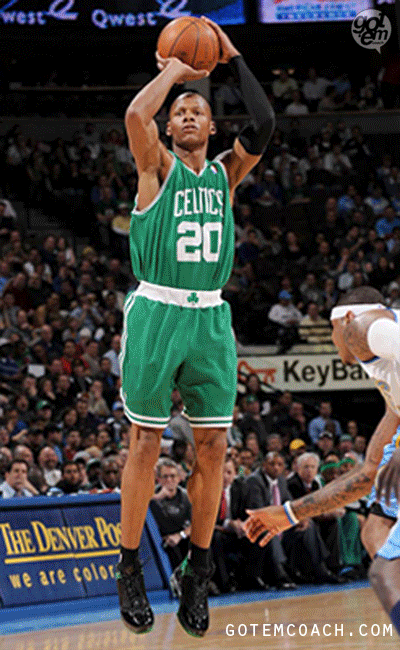 In addition, on a miss, a higher trajectory generates a shorter bounce, which increases the chances of hitting the ball into the basket.
In addition, on a miss, a higher trajectory generates a shorter bounce, which increases the chances of hitting the ball into the basket.
IMPORTANT: If 5 NET rolls in a row is too difficult, lower this requirement.
Coach's note: Players who consistently hit the back of the basket when shooting are overexcited. To correct this error, explain it, and start practicing CLEAN throws right away, encouraging them to be used throughout the season.
4. Make several free throws in a row before leaving the court after practice.
This requires repetition of all throw elements and builds confidence. Each batter must pick up the ball himself after his throw. Emphasize the importance of repeating the same set-up routine before each throw. Taking a deep breath and exhaling before the throw relieves excess tension. Modify this exercise by adding more playful tension due to time constraints. Those who do not fit in the given time must make jerks, etc.
5. Make 200 free throws per day for 5 days, or 500 free throws on one day, and 200 on the next four days. Target: 25/25 of which 15 rolls are CLEAR.
Target: 25/25 of which 15 rolls are CLEAR.
This develops confidence and exceptional consistency in shot form, ball release and trajectory. In addition, it improves the accuracy of 3-point shots. Reward the player for: 25/25, the most hits in a row, and the most CLEAR hits in a row. NOTE: 100 throws require approximately 15 minutes of time.
6. Determine the spots from which you regularly shoot in the game, and practice shooting at least 5 consecutive shots from each of these spots.
This develops confidence and coordination in throwing. When a player shoots from one of these positions in a game, they feel comfortable and confident because they have been successful shooting from these positions so often in practice.
7. Perform all throws on a correctly marked area using a correctly marked backboard. The court must have a line for 3-point shots.
Court markings are an important factor in reducing misses as it is easier for the player to judge the distance to the basket.